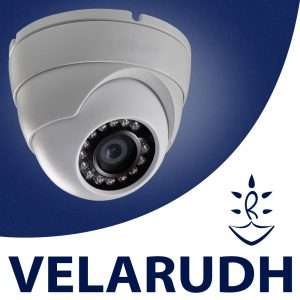Closed Circuit Television or CCTV in short, also known as video surveillance, is a system of cameras set in a location which requires video monitoring of the place for security and safety reasons. It consists of a set of cameras fixed in strategic locations of the premises, whose output is limited to one or a few monitors only with or without recording. Thus CCTV differs from broadcast television in that the output is limited as compared to broadcast whose output is available to anyone who has subscribed to the channel. The CCTV output may be point to point, point to multipoint, meshed wired or wireless links.

CCTV cameras are used for various purposes. Some of them are discussed below.
Crime Prevention:
CCTV has helped crime prevention to a great extent since its use started to rise in the late 20th century. The places where CCTV has helped crime prevention include car parks, city and town centers, public transport systems and public streets. A study has also found that CCTV monitoring could reduce unruly behavior of the crowd in football stadiums. CCTV has also successfully reduced theft in supermarkets and retail stores.
But questions have been raised about the effectiveness of CCTV cameras. While low-resolution cameras used for monitoring homes and small offices come cheap, the High Definition cameras in public places are often quite expensive. Another study in Britain showed that only one crime is detected per 1000 cameras. In 2009 an “Internet Eyes” website surfaced which paid visitors for monitoring and detecting crimes through CCTV video footage. But the concept was criticized by civil liberties campaigners as distasteful and worrying.
Body Worn Cameras:
In recent times the use of cameras that can be worn in the body of a person has found abundant usage. Such cameras are worn in the chest or head of the person, for example, a police officer or a private detective and the video footage is sent wirelessly to a video monitoring and recording setup.
Industrial processes:
Often industrial processes that are not safe for the humans are monitored using CCTV cameras. These include chemical plants, nuclear reactors and facilities for manufacturing nuclear fuel. In many places, thermographic cameras are used to monitor the temperature of the premises.
Traffic Monitoring:
Many cities throughout the world have CCTV cameras installed to monitor traffic, detect congestion and notice accidents. Some of these cameras are privately owned by companies offering transportation to send traffic data directly to the driver through GPS system.
Transport safety:
CCTV cameras are installed in public transport stations like subway, railway stations and airports to monitor passengers and transport activities.
Sporting events:
Some sporting events are monitored by CCTV cameras and the signals are sent to a central control system where the appropriate footage is chosen and sent to the connected televisions.
Monitoring office and business place:
Many employers wish to monitor their workplace to identify employee theft, inappropriate behavior as well as several daily business activities like moving of goods, scanning of goods, reporting activities, etc.
Criminal Use:
One of the disadvantages of inexpensive CCTV cameras is their rising usage for criminal activities. For example criminals are using CCTV cameras in ATMs to find out the ATM PIN that a customer keys into the ATM machine. This is used to steal money from the bank accounts.
Home Security:
CCTV cameras are used for securing homes and to monitor children’s, elderly people’s activities from a convenient device like mobile phone or laptop.
The first CCTV camera was installed by Nazi Germany in 1942 during the World War II to monitor rocket launch. As of 2016 there are 350 million surveillance cameras worldwide, 65% of which are installed in Asia.
There are various types of CCTV cameras like the bullet camera, dome camera, IR camera, PTZ camera, IP camera, wireless camera, etc. The cameras also vary according to their megapixel strength. Each has its own usage and an expert can guide you as to which one you may need for the safety and security of your home, office, business, retail store, school and other areas requiring video surveillance.
Several companies offer CCTV cameras and accessories like DVR and NVR. Some of the popular brands are Hikvision, CP Plus, Honeywell, Dahua, Bosch as well as bigger brands like Samsung, Panasonic, etc.

Interesting post, thanks for sharing.